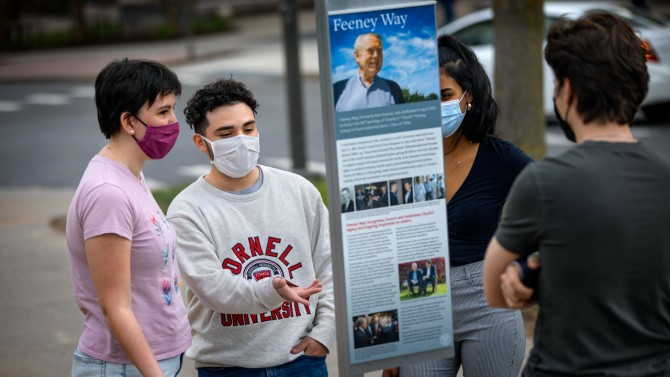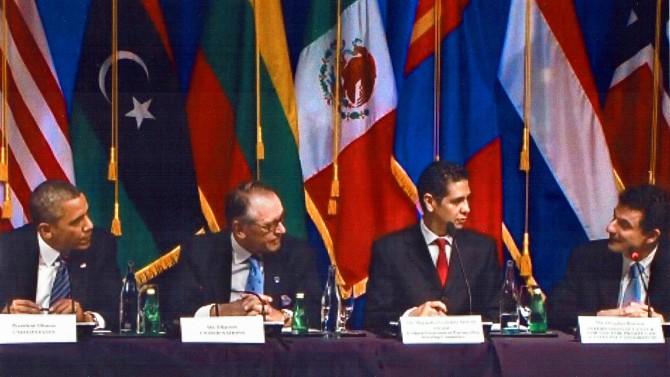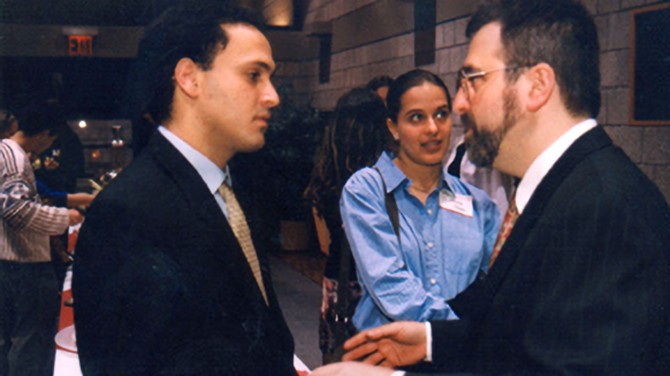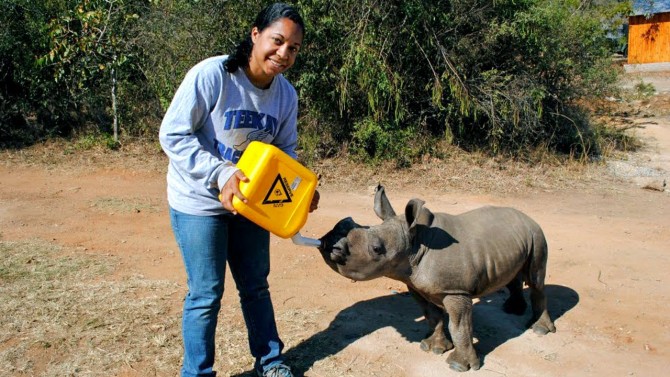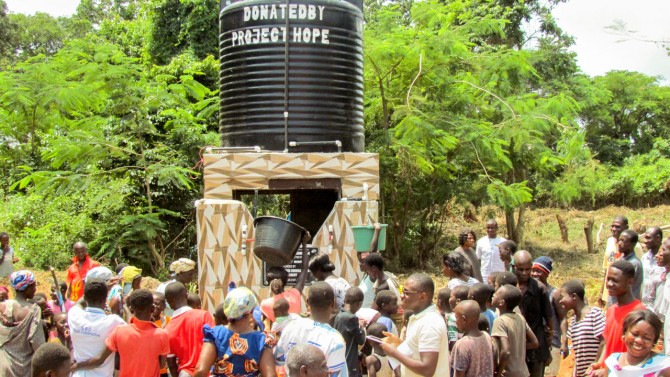Cornell Tradition alumni reflect on program’s lifelong impact
By Joe Wilensky
The Atlantic Philanthropies’ very first gift to Cornell in the early 1980s – $7 million – created The Cornell Tradition, an undergraduate fellowship program combining work, service and scholarship opportunities to instill a strong work ethic in civic-minded students.
The foundation’s final gift, before winding down its operations in 2016, was the same: $7 million to The Cornell Tradition.
In the decades in between, the organization – founded by Charles F. “Chuck” Feeney ’56 – donated Feeney’s entire fortune to worldwide causes, including nearly $1 billion to Cornell.
This year, following the renaming of the former East Avenue on Cornell’s Ithaca campus as “Feeney Way” in April to honor Cornell’s most generous donor, alumni of The Cornell Tradition program are reflecting on the philanthropist’s impact on their lives.
Through Atlantic, Feeney transformed Cornell through investments in student financial assistance; the residential campus experience; academic initiatives and faculty hiring; athletics; funding the entire first phase of the Cornell Tech campus in New York City; and much more. That also included more than $40 million to the Tradition program, supporting more than 6,000 students and, through student loan relief, enabling many of them to pursue careers in public service.
Earlier this month, several alumni of the program reflected on its mission, how it shaped their Cornell experiences, and how its values informed their lives and careers after graduation.
Doug Rutzen ’87 (A&S):
“In 1983, I had the honor of being in the first class of Tradition fellows and the Tradition’s first student employee. I was profoundly impressed by the program’s focus on hard work and public service. I was similarly impressed by the power of philanthropy, and that a (then) anonymous donor would invest in me. Thanks to the Tradition’s summer job network, I landed a job with the Caribbean Council for the Blind.
“Unshackled from student debt and based on these experiences, I decided I would devote my career to the nonprofit sector, philanthropy and public service around the world. Today I run an international nonprofit (the International Center for Nonprofit Law), and over the past 30 years, we’ve worked with presidents and prime ministers, parliaments and human rights activists, to safeguard civil society, philanthropy and democracy in over 100 countries. Simply stated, the Tradition changed my career trajectory and enabled me to pursue a career in public service.”
Nicole DelToro ’91 (A&S) and a member of the Cornell Board of Trustees:
“I was a first-generation college student, putting myself through Cornell with the help of financial aid. The Cornell Tradition enabled me to graduate nearly debt-free. I was so grateful to be able to attend Cornell that after I graduated, I immediately wanted to do whatever I could for the university, and for those who followed after me.
“I had done service work in high school, but it was really through the Cornell Tradition that the concept of service became embedded in my DNA. As a student, I taught English as a foreign language to Ithaca residents and volunteered on a regular basis through my sorority.
“Since graduation, I’ve volunteered in many different ways for Cornell, but, just as importantly, I’ve focused on service in my community. My children have been volunteering with me since they were 3 years old, cleaning up schools and waterways, serving the homeless. I own a small business and we do quarterly service projects, ranging from volunteering at soup kitchens to counseling members of the military who are leaving and entering the private sector workforce.
“I have always felt that it was important to ‘pay it forward’ – to enable future generations of Cornellians to have the same opportunities I’ve had. While I may not be able to give financially at Chuck Feeney’s level, I’ve always wanted to challenge myself with my philanthropy, whether by giving at the Tower Club level for the first time as a young alum to offering Giving Day matches and now supporting first-gen students with access grants.
“I’m so thankful that Mr. Feeney became more public (though still humble) about his philanthropy in recent years. His story is so incredibly inspiring. He’s touched so many Cornellians, but has also had an impact on global health and peace initiatives. I am thrilled that he was willing to allow us to recognize him. It’s so critical that every Cornellian know about his generosity.
“I can’t wait to be able to get up to campus to see the sign in person and take a selfie with it!”
Itai Dinour ’01 (ILR):
“The Cornell Tradition was a life-changing and career-path altering catalyst. I came to ILR on a corporate, pre-law track, but experiences in the greater Ithaca community, supported by Tradition and the Public Service Center, exposed me to the possibilities of a deeply rewarding and impactful career in the nonprofit sector.
“In addition, at the Cornell Tradition convocation my junior year, I met Michael Brown, the co-founder of City Year, a national service organization that partners with communities to help students and schools succeed while preparing the next generation of civically engaged leaders who can work across lines of difference. City Year (another early beneficiary of Feeney’s philanthropy) appealed to me and a few years later, after the tragic events of 9/11, I joined the startup team of City Year New York.
After 12 years of supporting a growing number of AmeriCorps members in New York City and then nationally, I joined the foundation of David Einhorn ’91, now called Einhorn Collaborative. At the foundation, I continue to support the civic development of young people, including our deep partnership with Cornell, to provide all students with high-quality community-engaged learning experiences.”
Jeff Lamontagne ’91 (CALS):
“The Cornell Tradition instilled in me that whatever else I was doing, however busy I was otherwise, that it was not only possible but profoundly important to set aside time and energy to serve your community.
“When there were four suicides at my neighborhood high school one year, I joined forces with a number of people from my church and we developed a new professional counseling services delivery model that served thousands of kids at risk for suicide. I don’t think that would have happened if it weren’t for the way I viewed the world, and my role in it, after being a Cornell Tradition Fellow.
“After co-founding Second Wind Fund in 2002 and leading it for almost 10 years, I have gone on to lead two other nonprofits. At every stop, I have been surrounded by people who also wanted to give back to the community. In each case, I think that people fed off my energy – an energy that constantly emphasizes a sense of mission.
“I approach every day in nonprofit work as an opportunity to create greater good. The roots of that ethic can be traced back to my time as a Cornell Tradition Fellow, and I think that others are inspired to work with a mission-first mentality when leadership conveys that ethic.”
Karryssa Fenderson ’14 (CALS):
“Chuck Feeney’s legacy and the Cornell Tradition have instilled in me a commitment to service that extends beyond my time on the Hill. As a Cornell student, I started volunteering on campus, in New York City for Alternative Breaks, and internationally. This blossomed into coordinating and directing volunteer-based veterinary clinics for low-income communities as a vet student.
“My passion is still evolving in my new career as a veterinarian – leading my local veterinary association as president, spending my off days at the animal shelter or providing veterinary services to those in need, and mentoring the younger generation pursuing a career in medicine. What would a life be without giving back? The gratitude I find helping others is one I hope will inspire those around me, as well as generations to come.”
Osei Boateng ’18 (Human Ecology), MHA ’20:
“Whether it was serving in Ithaca with local nursing homes or in Ghana providing potable water for a rural community, serving through society-building volunteer work is of importance to me. Through service projects, I have discovered a desire to make a difference.
“One of my greatest accomplishments as a Tradition fellow was partnering with physicians and medical students to educate the community on the risk factors of hypertension and diabetes and screen [them] for these diseases. Since then, the project has grown to become a nongovernmental organization (OKB Hope Foundation) that seeks to serve the underserved and vulnerable population in Ghana.
“Last year, through our partnership with The Cornell Tradition, we took 11 Cornell undergraduates on a trip to Ghana. The goal was to educate the students on the importance of service and how their small actions can make a large impact on the lives of people. Students on this trip got the opportunity to immerse themselves in the culture, participate in our annual health education and screening program, and shadow physicians across various hospitals in Ghana. We hope to expand this program to all college students in the U.S. and continue to serve the underserved and vulnerable population in Africa.”
Alumni remain engaged with program
Suzanne Horning, Cornell Tradition coordinator, said she is continually impressed with how willing Tradition alumni are to engage with the program and the current fellows – participating in many opportunities virtually during the past year.
“This has been a fantastic way for fellows to connect with alums who have walked in their shoes,” she said. “The alumni answered all kinds of questions, ranging from how they found community service opportunities while on campus and then in their new home communities, to how they still make service a priority with a job and a life. These connections are so important for the current fellows to see that they will be able to continue to live the ideals of The Cornell Tradition even after they graduate and move into the next chapter of their lives.”
This story originally appeared in the spring 2021 issue of Ezra magazine.
Media Contact
Get Cornell news delivered right to your inbox.
Subscribe
